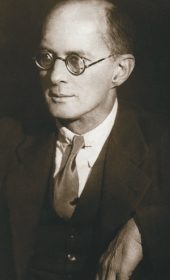Bronislaw Malinowski has been called the Joseph Conrad and Rider Haggard of anthropology, reflecting both his “romantic fascination with the culturally exotic” and a career that found him working from the South Seas to Mexico—to say nothing of the halls of the London School of Economics where he taught for more than 20 years. Considered to be the father of modern anthropological fieldwork, Malinowski trained two generations of ethnographers and guided the direction that British social anthropology was to take for decades.
Malinowski was born in what is now Krakow, Poland, on April 7, 1884, to a well-to-do academic family. He received his Ph.D. in physics and mathematic from Jagiellonian University in 1908. He read James Frazer’s The Golden Bough in English while recuperating from an illness, and his interests in anthropology, psychology, and folklore blossomed. He studied with the famous psychologist Wilhelm Wundt for three semesters at Leipzig and went on to the London School of Economics, one of Europe’s centers of anthropology, before World War I (receiving a D.Sc. there in 1916 on a library study written in 1913).
 At the start of World War I in 1914, Malinowski was traveling back and forth between Australia and various field sites. Technically being an enemy alien in British Commonwealth territory, he could have been arrested but instead was allowed to continue his fieldwork in the Trobriand Islands off the coast of New Guinea for some 2 years. This fieldwork was the basis for much of the classic Malinowski canon, including his most famous works Argonauts of the Western Pacific (1922), Crime and Custom in Savage Society (1926), Sexual Life of Savages (1929), and the two volumes of Coral Gardens and Their Magic (1935).
At the start of World War I in 1914, Malinowski was traveling back and forth between Australia and various field sites. Technically being an enemy alien in British Commonwealth territory, he could have been arrested but instead was allowed to continue his fieldwork in the Trobriand Islands off the coast of New Guinea for some 2 years. This fieldwork was the basis for much of the classic Malinowski canon, including his most famous works Argonauts of the Western Pacific (1922), Crime and Custom in Savage Society (1926), Sexual Life of Savages (1929), and the two volumes of Coral Gardens and Their Magic (1935).
Malinowski is most well known for his major contributions to anthropological theory. Functional-ism, in the sense that he used the term, sees every social institution as existing to satisfy one of seven basic needs of the individual: nutrition, reproduction, bodily comforts, safety, relaxation, movement, and growth. The task of the functionalist is to show how cultural beliefs and practices not only smoothly integrate society but also offer psychological and biological sustenance for the individual.
Although Malinowski is not as well known as his work in social anthropology, his contributions to linguistics were also significant. He included, for example, an extensive essay on the role of language in Coral Gardens. In addressing issues of translations of Trobriand magic chants, he argued that none could actually be made because they had no real semantic content. Nonetheless, these chants accomplished tasks in Trobriand society, such as ensuring a plentiful harvest and indicating who had rights to certain gardens, even though the chants were meaningless. Malinowski’s idea of “phatic communication”—that some language is used to maintain social contact rather than to exchange meaningful information—is still an important concept in sociolinguistics.
Malinowski became a visiting professor at Yale University in 1940, but lingering poor health took his life in 1942. As important as he was, Malinowski was not without faults or detractors. He was sometimes prone to self-promotion, his relationships with women were occasionally tumultuous and much discussed, and some considered his theoretical perspectives to be mere biological reductionism. The posthumous publication of his private journal while in the Trobriands, A Diary in the Strict Sense of the Term (1967), and letters to his wife, The Story of a Marriage: The Letters of Bronislaw Malinowski and Elsie Masson (1995), revealed some of Malinowski’s all-too-human thoughts of both informants and colleagues. But his place in the history of anthropology is ensured. If nothing else, the scores of students he trained, including Raymond Firth, E. E. Evans-Pritchard, Meyer Fortes, Lucy Mair, Ian Hogbin, and Hortense Powdermaker, ensure that nearly every anthropologist today is a Malinowskian functionalist, at least in some way.
References:
- Firth, R. (Ed.). (1957). Man and culture: An evaluation of the work of Malinowski. London: Routledge & Kegan Paul.
- Stocking, G. (1995). After Tylor: British social anthropology 1888-1951. Madison: University of Wisconsin Press.
- Young, M. (Ed.). (1979). The ethnography of Malinowski. London: Routledge & Kegan Paul.

